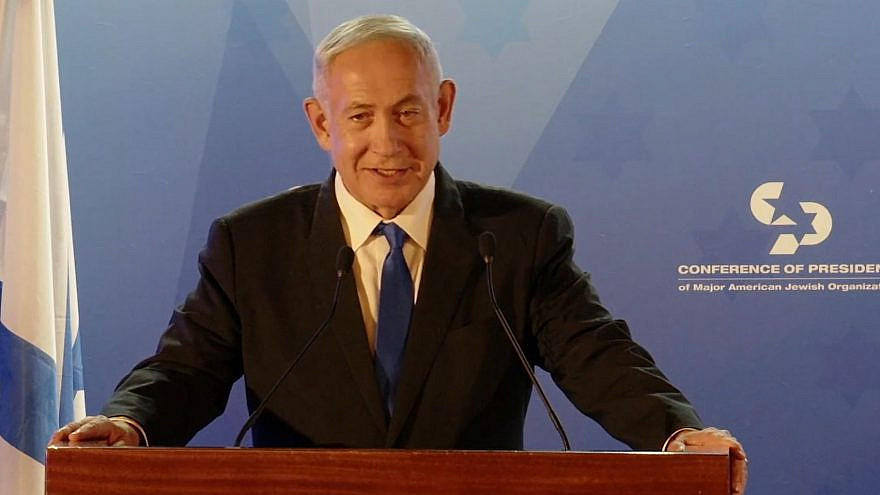Prime Minister Benjamin Netanyahu spoke about Iran, the Abraham Accords, and judicial reform in an address to U.S. Jewish leaders in Jerusalem on Sunday.
Netanyahu, in his address to the National Leadership Mission of the Conference of Presidents of Major American Jewish Organizations at the capital’s Inbal Hotel, began by touching on his government’s judicial reform program.
“I’d love to speak to you about it at length. And to tell you why you shouldn’t worry. But for the moment, I’m prevented from doing that because I’ve been given a gag order,” the prime minister said.
Calling the gag order “patently ridiculous,” he said he would nonetheless reserve his comments on the subject to three points:
2) “All democracies should respect the will of other free peoples, just as we respect their democratic decisions”—a reference to comments by certain U.S. administration officials, including President Joe Biden, who have weighed in on Israel’s judicial reform debate; and
3) Opposition rhetoric against judicial reform has been “frankly reckless and dangerous, including calls for bloodshed in the streets and calls for civil war.” This has encouraged Israel’s enemies such as Hezbollah to believe Israel is on the verge of collapse, Netanyahu said.
“I’m going to disappoint Israel’s enemies. If you’re waiting for a civil war, it ain’t going to happen…. There will be no bloodshed, I hope, none at all. Yes, we have heated debates in Israel. We’ve always had. Yes, Israel is a rambunctious democracy. It’s always been one. But we are one people with one destiny with one country with one faith,” Netanyahu said.
“And for 75 years we have stood together side by side to establish, defend and build our one and only state and we will continue to work to secure that homeland for generations to come.”
The prime minister also addressed the issue of Iran, which he described as the main priority as a nuclear Islamic Republic puts Israel and the world at risk.
Netanyahu said there was a “growing understanding” not only between the U.S. and Israel but also internationally of the danger that Iran poses to world peace.
The prime minister confided to the audience that the issue of Iran was “the primary reason, the real reason, and the first reason” for his return to Israeli politics.
The second reason for his return was to deepen the ties between the signatories of the Abraham Accords, the peace agreements signed between Israel and several Muslim countries in 2020, and to expand them to other Muslim states.
Netanyahu recalled that the success of the accords depended on overcoming an assumption held by “foreign policy elites” that peace with Arab countries in the region could only be achieved by first making peace with the Palestinians.
But the “dysfunctionality” of Palestinian politics made that impossible. “I always thought that the way the way we should act is not inside out but outside in, because of the dysfunctionality,” he said.
“That meant that if we waited for [the Palestinians], we’d wait forever. And that’s why I thought that we should go around and get to the Arab world. And the reason we could get to the Arab world is because they, too, recognize the primacy of the Iranian threat,” he said.
Netanyahu said he wanted to expand the Abraham Accords, in particular to Saudi Arabia. “A form of peace with Saudi Arabia will be a quantum leap because I think it will change Israel’s relationship with the rest of the Arab world. It will lead to the effective ending of the Israeli-Arab conflict.
“I think it will be a historic turning point, at least as big as the Abraham Accords, as big as Camp David [the 1978 accords with Egypt that led to the peace treaty the following year], and I think it would launch a historic change in Israel’s position in the Middle East,” he said.
“This is a goal that we’re working on in parallel with the goal of stopping Iran. The two are in many ways intertwined,” Netanyahu said.


























